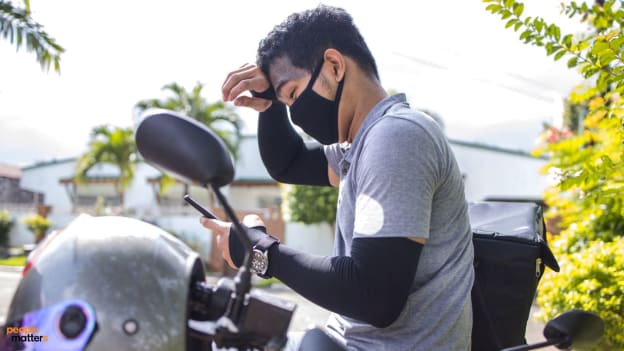Singapore revises safety measures for workers in extreme heat

Failure to adhere to the rules could result in penalties and work stoppage, the Ministry of Manpower said.
SINGAPORE – The Ministry of Manpower has updated its safety rules and recommendations for employers managing workers under extreme heat. The measures reiterate the national heat stress advisory from 2023.
The MoM’s revised framework stresses which measures are mandatory – such as allowing workers to rehydrate regularly and providing shaded rest areas for them to recover – and which ones are only recommended, such as extending break times for workers when extreme heat conditions worsen.
“As heat strain experienced by individual workers is multi-factorial, layering on different heat stress measures provides more protection for workers,” the MoM said.
Acclimatise, drink, rest and shade
The ministry said all workplaces must assess whether work can be carried out safely, including implementing an effective heat stress management programme.
“Employers must implement the required heat stress measures at varying Wet Bulb Globe Temperature (WBGT) bands focusing on the four aspects of acclimatise, drink, rest and shade to reduce heat stress risks for outdoor workers,” the MoM said.
The WBGT indicates how a combination of weather elements raises the risk of heat stress, especially under direct sunlight. These include temperature, humidity, wind speed, sun angle and cloud cover.
In instances where the WBGT reading is at 33°C or higher, for example, employers must ensure workers “rehydrate at least hourly, with a recommended intake of 300 milliliters per hour or more depending on work intensity,” the MoM said.
At the same time, employers can also consider resetting their hours for outdoor physical work to cooler parts of the day and giving workers hourly breaks of at least 15 minutes when taking on heavy physical work.
Failure to adhere to the rules could result in penalties and work stoppage, the ministry said, adding that it would begin making the rounds at worksites to check whether employers are compliant.
Read More: Climate crisis and the decline of productivity
The most vulnerable workers under extreme heat
The MoM also reminded employers of different groups of workers considered to be the most vulnerable to heat stress:
- Older workers aged 65 and above
- Pregnant workers
- Overweight or obese workers
- Those newly assigned to outdoor work
- Those unacclimatised to working in hot environments, such as new or returning workers from countries with cold climate
- Those returning from long leave of more than 1 week
- Those currently unwell or recovering from illness
- Those with personal risk factors such as chronic diseases, medication use, or history of heat injury
For those included in the categories above, who have other medical conditions or are uncertain about their level of fitness, the MoM recommends consulting with a medical doctor and getting certified fit to work outdoors.
“Employers who wish to deploy vulnerable workers have a duty to ensure they are fit for outdoor work. They should seek the worker’s consent and make provisions for the worker to consult a medical doctor,” the ministry said.
Read More: Singapore leads in protecting outdoor workers from rising temperatures
Melvin Yong, the assistant secretary-general of the National Trades Union Congress, welcomed the updated measures, given the rising average temperature that Singapore and the rest of Southeast Asia endure between March and June.
“As our annual average temperature continues to trend up, the likelihood of our workers encountering heat stress will only continue to grow,” Yong said.
“For example, older workers with pre-existing medical conditions may be at higher risk, as their thermoregulatory system may be compromised. Certain medications may also impair a person’s ability to respond to heat stress adequately,” the NTUC official said.















